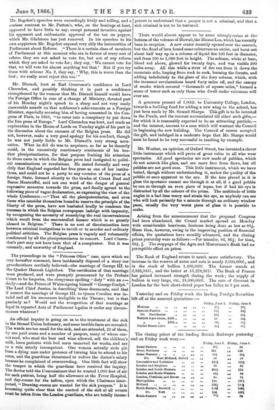Mr. Disraeli, hurt at Earl Grosvenor's confidence in Lord Clarendon,
and possibly thinking it in part a confidence strengthened by the rumour that Mr. Disraeli himself would have the Foreign Office in case of a change of Ministry, devoted part -of his Monday night's speech to a sharp and not very easily answerable assault on that nobleman's achievements as a Foreign Minister, especially accusing him of having consented in the Con- gress of Paris, in 1856, " to enter into a conspiracy to put down the free press of Europe." Lord Clarendon was hurt, and made an explanation in the House of Lords on Tuesday night of his part in the discussion about the excesses of the Belgian press. He did not, however, make a very good apology for his conduct, though he was not justly liable to Mr. Disraeli's very strong accu- sation. What he did do was to acquiesce, as far as he deeently could, in the excessively reactionary sentiments of his bro- ther plenipotentiaries, for that purpose limiting his attention to those cases in which the Belgian press had instigated to politi- -cal assassinations or revolutions. He stated formally and very • drily that England regarded her free press as one of her institu- tions, and could not be a party to any coercion of the press of a foreign State, listened silently to the tirades of Count Bud l and Baron Manteuffel, said not one word of the danger of general repressive measures towards the press, and finally agreed to the following piece of vague declamation, as expressing the view of the whole Conference :—" That all the plenipotentiaries, and even those who consider themselves bound to reserve the principle of the liberty of the press, have not hesitated loudly to condemn the excesses in which the Belgian newspapers indulge with impunity, by recognizing the necessity of remedying the real inconveniences which result from the uncontrolled licence which is so greatly abused in Belgium." There is no sort of discrimination here between criminal instigations to revolt or to murder and ordinary political criticism. The Belgian press is vaguely and vehemently .condemned by all the plenipotentiaries in concert. Lord Claren- -don's part may not have been that of a conspirator. But it was arnmanly, and unworthy of England.






























 Previous page
Previous page